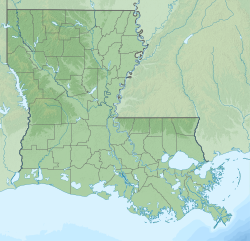| Battle of Monett's Ferry | |||||||
|---|---|---|---|---|---|---|---|
| Part of the American Civil War | |||||||
 William H. Emory was in tactical control of the Union forces at Monett's Ferry. | |||||||
| |||||||
| Belligerents | |||||||
|
|
| ||||||
| Commanders and leaders | |||||||
|
Nathaniel P. Banks William H. Emory Henry Warner Birge |
Richard Taylor Hamilton P. Bee George W. Baylor | ||||||
| Units involved | |||||||
|
Department of the Gulf XIII Corps and XIX Corps |
Dept. of West Louisiana Bee's Cavalry Corps: 4 cavalry brigades, 4 artillery batteries | ||||||
| Strength | |||||||
|
Banks: 25,000 Emory: 15,000 |
Taylor: 5,200 Bee: 2,000 | ||||||
| Casualties and losses | |||||||
| 300 | 50 | ||||||
Location in Louisiana | |||||||
The Battle of Monett's Ferry or Monett's Bluff (April 23, 1864) saw a Confederate States Army force led by Brigadier General Hamilton P. Bee attempt to block a numerically superior Union Army column that was commanded by Brigadier General William H. Emory during the Red River Campaign of the American Civil War. Confederate commander Major General Richard Taylor set a trap for the retreating army of Major General Nathaniel P. Banks near the junction of the Cane River with the Red River. Taylor assigned Bee's troops to plug up the only outlet from the trap while Taylor's other forces closed in from the rear and sides.
Emory responded by sending an infantry brigade to cross the river upstream and turn Bee's left flank. During the battle, Bee ordered a retreat, fearing that his troops were about to be surrounded. This allowed Banks' army to escape the trap and reach temporary safety at Alexandria, Louisiana. Taylor was so disappointed that he relieved Bee from command, despite the fact that Bee's subordinates agreed with his decision to withdraw.[1]
- ^ "Monett's Ferry (Cane River Crossing)." Columbus, Ohio: Department of History, The Ohio State University, retrieved online November 2, 2023.
